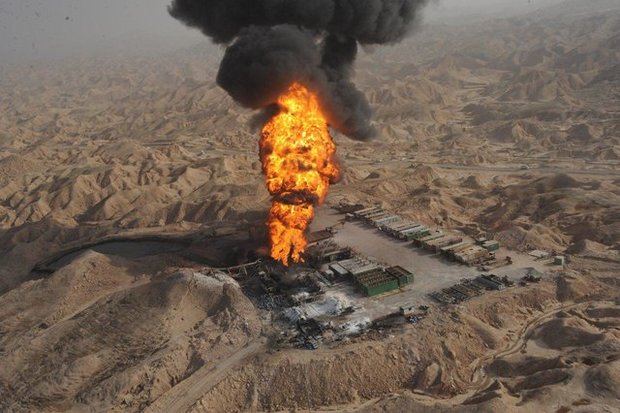December 29, 2017

President Trump’s new National Security Strategy” paper, issued last week, doesn’t have anything nice to say about Iran but it also doesn’t give any indication what strategy Trump will use to cope with the Islamic Republic.
The document cites Russia, China, North Korea and Iran as the only four countries seriously challenging the United States. It lays out the threats they pose, along with the threat from transnational terrorism, but the document really does not say much about any Trump strategy for dealing with them.
“China and Russia challenge American power, influence, and interests, attempting to erode American security and prosperity,” the document says up front. “They are determined to make economies less free and less fair, to grow their militaries, and to control information and data to repress their societies and expand their influence.
“At the same time, the dictatorships of the Democratic People’s Republic of Korea and the Islamic Republic of Iran are determined to destabilize regions, threaten Americans and our allies, and brutalize their own people.
“Transnational threat groups, from jihadist terrorists to transnational criminal organizations, are actively trying to harm Americans.
“While these challenges differ in nature and magnitude, they are fundamentally contests between those who value human dignity and freedom and those who oppress individuals and enforce uniformity….”
The most notable part of the strategy document is that, unlike the last Obama strategy statement, Trump’s document does not cite climate change as a national challenge.
Trump’s document adds a region-by-region analysis, in which is it addresses Iran in more detail. But the detail outlines what Trump’s sees as bad about the Islamic Republic, while ignoring what he is going to do about it.
“For years, the interconnected problems of Iranian expansion, state collapse, jihadist ideology, socio-economic stagnation, and regional rivalries have convulsed the Middle East,” Trump’s document states. “The United States has learned that neither aspirations for democratic transformation nor disengagement can insulate us from the region’s problems.” It says, in a swipe at Obama. “We must be realistic about our expectations for the region without allowing pessimism to obscure our interests or vision for a modern Middle East,” Trump says, in what is as close as he comes to a strategy.
“Iran, the world’s leading state sponsor of terrorism, has taken advantage of instability to expand its influence through partners and proxies, weapon proliferation, and funding. It continues to develop more capable ballistic missiles and intelligence capabilities, and it undertakes malicious cyber activities. These activities have continued unabated since the 2015 nuclear deal. Iran continues to perpetuate the cycle of violence in the region, causing grievous harm to civilian populations. Rival states are filling vacuums created by state collapse and prolonged regional conflict,” the Trump document states in a sort of checklist of evil.
Then, the document says, “Today, the threats from jihadist terrorist organizations and the threat from Iran are creating the realization that Israel is not the cause of the region’s problems. States have increasingly found common interests with Israel in confronting common threats.” That was written before Thump recognized Jerusalem as the capital of Israel and turned much of the region’s focus back on Israel.
In his speech unveiling the new document, Trump sounded much like the Trump of the campaign trail, more concerned with blaming the Obama Administration than outlining a new policy for a Trump Administration. “Our leaders engaged in nation-building abroad but failed to build up and replenish our nation at home,” Trump said, blaming his predecessor for a “disastrous, weak and incomprehensively bad deal with Iran and allow[ing] terrorists, such as ISIS, to gain control of vast parts of territory all across the Middle East.”
In the closest the document got a strategy for Iran, the National Security Strategy document says: “We will work with partners to deny the Iranian regime all paths to a nuclear weapon and neutralize Iranian malign influence…. We will work with partners to neutralize Iran’s malign activities in the region.” But those statements—really a goal rather than a strategy—could have been written just as easily by the Obama Administration.
In Tehran, Foreign Ministry spokesman Bahram Qasemi responded with a stream of invective. “What has been portrayed in this unconventional text devoid of any rationality or reason was nothing but the repetition and rehashing of baseless and groundless accusations and illusions of a few delusional countries in the region and the US,” he said.
He added that the threats the document outlines are mostly the fault of the United States for its bad policies pursued over past decades.























